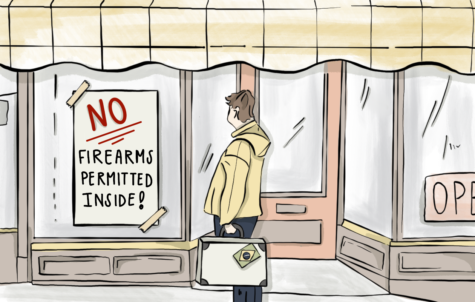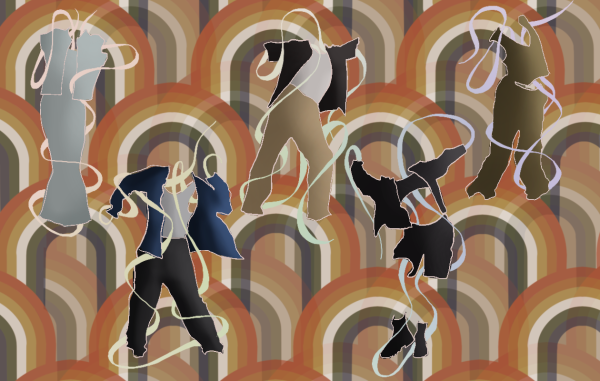defining homesickness with dr. margaret runge
Kent State University is rich in study abroad experiences. Fashion students are particularly fortunate to be able to choose from New York City, Florence, Paris, London, Germany, Hong Kong, South Korea and Los Angeles when studying abroad. Perhaps it has always been your dream to go abroad, or it is just one of the many requirements you will need to graduate. Nevertheless, studying abroad is bound to show you new facets of yourself that would have otherwise remained hidden.
With this newfound strength will come newfound emotions, and you may find yourself yearning for the comfort of your own home. Homesickness is normal for college students, especially those going abroad. A literature review by Talita Ferrara, M.S., in 2020 defined homesickness as “a complex cognitive-motivational-emotional state concerned with grieving for, yearning for and being occupied with thoughts of home.” Although there are multiple studies on the rate of homesickness between first-year college students, not a lot of studies are provided on the rate of homesickness between international and abroad students.
Dr. Margaret ‘Mags’ Runge is a professor and student life coordinator in the Kent State University Florence community. She earned her Ph.D. in Clinical-Community Psychology at the University of South Carolina in 2005 and became a licensed clinical psychologist in 2006. Since moving to Florence from the United States in 2005, Runge has enjoyed teaching study abroad students and providing psychotherapy to a number of students and private clients. In her interview with A Magazine she provided her own definition of homesickness as “negative feelings, like anguish, anxiety or sadness, related to a place to which or people with whom one has an emotional attachment. It is a longing for that place or for those people to which one feels attached emotionally. Sometimes it can be a longing for the familiarity, certainty or comfort that a place or people provide.”
Feelings remain both individual and complicated. For some, homesickness can appear after stepping off the plane. For others, it will build gradually over time. Which begs the question, is homesickness an initial feeling or one that can develop over time? Runge notes that feelings can grow in intensity, as the person can really enjoy the first few weeks in a new place, and then start to feel that longing for home when they come up against a difference between their home and host culture. For instance, when studying abroad in Florence, the slower way of life can be a culture shock for those used to the fast pace American culture. However, in the end, homesickness is individual to the person experiencing it, and should be treated accordingly.
What are some healthy ways to deal with homesickness?
Runge notes that once again, this really depends on the person. Dealing with the feeling of homesickness in a healthy manner usually involves finding a balance between your new environment and staying connected with family and friends back home. In a profound choice of words, Runge said, “It also involves moving the foundation of a sense of security– from the environment to within oneself.”
Additionally, healthy ways of dealing with homesickness involve doing all the things that make people feel happy in any setting– eating nutritious meals, getting a full night’s sleep, exercising and tending to relationships that help them feel supported. For some people, setting a routine may make the transition easier as well. Ultimately, it is important to acknowledge that feeling homesick is both normal and temporary. Your feelings are completely valid and most likely reflected by your peers; do not be afraid to reach out to others for support or a listening ear.
Now for what Runge described as the million dollar question: How can you validate your feelings while also being open to new experiences? The first step is to validate how one is feeling, as validation helps a person feel more secure.
“What we know about people is that, when they feel secure, they are open to exploring new experiences,” Runge said. “If they feel judged or that they are not doing the experience well, they have a tendency to shut down and to be closed to new experiences.”
She also encourages people to seek new experiences at their own pace. Different people have different personalities and sometimes living abroad is enough of a challenge for some people, while others crave more new experiences in addition to being abroad. Nevertheless, everyone has their own timeline, and everyone is on the right track.
In the end, there is no correct way to cope with homesickness as the feeling is individual to the person experiencing it. Taking care of yourself and your mental health is the most important while abroad. When you feel your best, the experiences and life lessons will surely follow. If you are studying abroad in Florence this semester or sometime in the future, Dr. Mary Ann Bellini and Dr. Margaret Runge are both happy to help anyone struggling with homesickness.
Support Student Media
Hi, I’m Grace Avery, the Editor In Chief of A Magazine. My staff and I are committed to bringing you the most important and entertaining news from the realms of fashion, beauty and culture. We are full-time students and hard-working journalists. While we get support from the student media fee and earned revenue such as advertising, both of those continue to decline. Your generous gift of any amount will help enhance our student experience as we grow into working professionals. Please go here to donate to A Magazine.
















